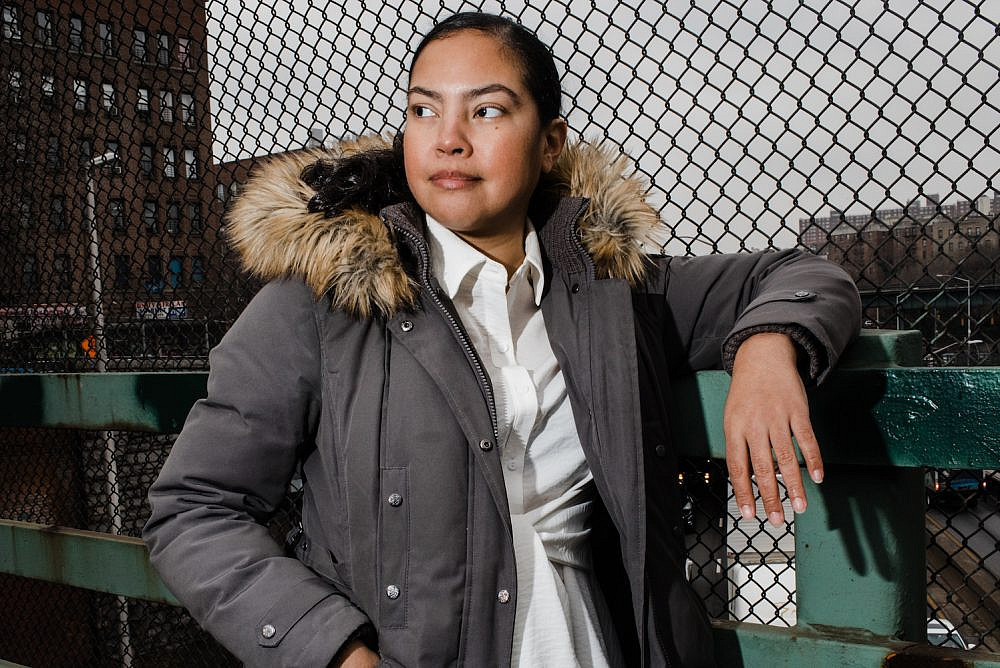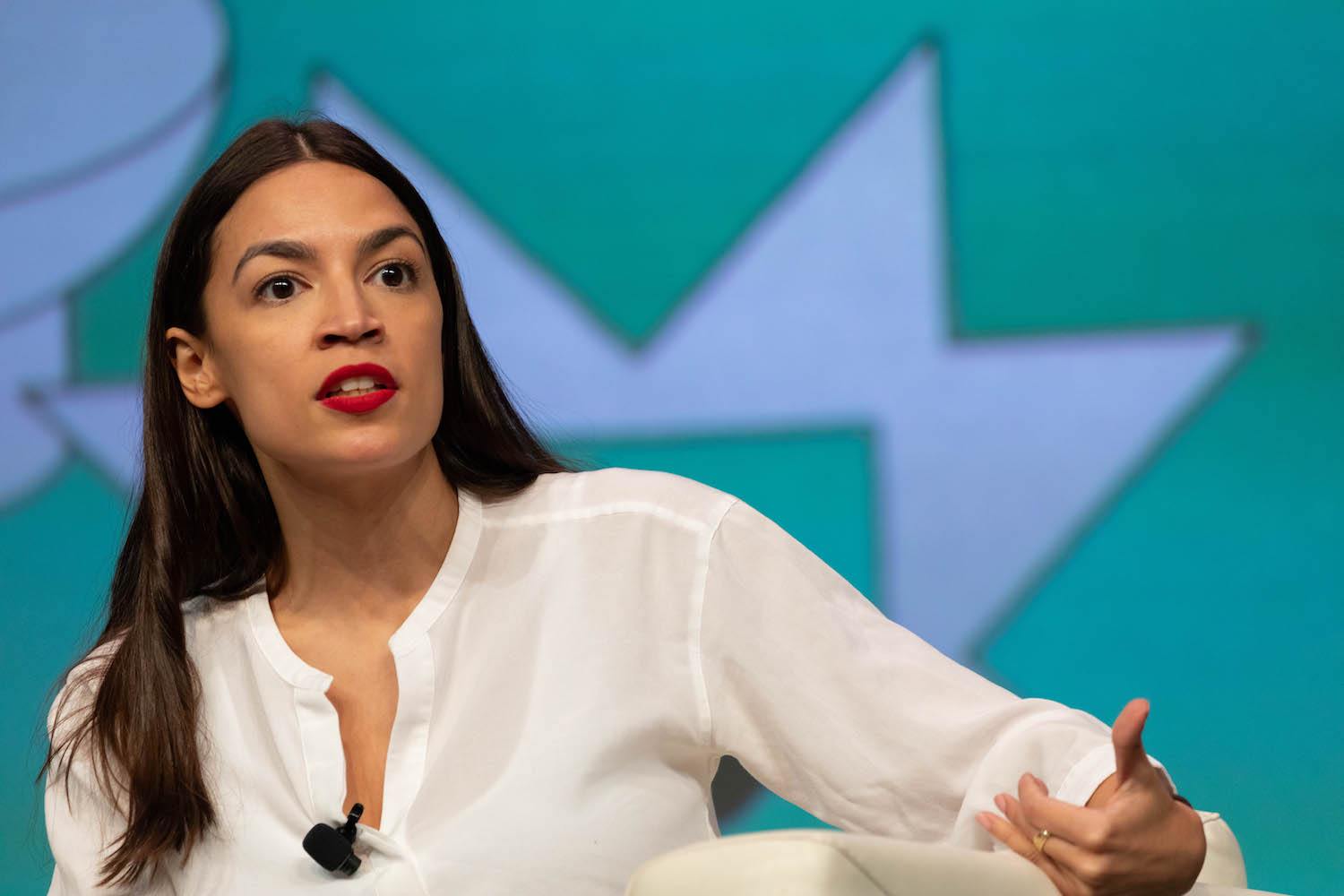As one of 12 Democratic candidates running to represent New York’s 15th congressional district in the U.S. House of Representatives this June, Samelys Lopez has to distinguish herself. One way the community organizer from the South Bronx is doing so is by speaking out on Palestine.
Unlike her main opponents — New York City Councilman Ritchie Torres, who has pitched himself as a progressive for Israel, and Ruben Diaz Sr., whose Israel support stems from his evangelical background — Lopez is staunchly committed to Palestinian human rights. Her pro-Palestinian stance has won her the endorsement of Jewish Voice for Peace Action, the political and advocacy arm of Jewish Voice for Peace.
“I stand against colonization and human rights abuses in every continent and will fight for liberation from occupation for all people,” Lopez said in a statement accompanying the news of JVPA’s endorsement.
JVPA is only one of over a dozen progressive organizations to endorse Lopez, who is running to replace Congressman Jose Serrano, who is retiring after 30 years of service. Lopez, a co-founder of Bronx Progressives, which grew out of the 2016 movement to elect Bernie Sanders, has also been endorsed by the Sunrise Movement, a youth-led group fighting for climate justice; the Democratic Socialists of America; and the Working Families Party.
Her biggest endorsement, however, has come from Alexandria Ocasio-Cortez, the democratic socialist congresswoman who has electrified the American left ever since she defeated longtime Rep. Joe Crowley in the 2018 midterm elections.
Lopez’s outspokenness on Palestinian rights, her endorsement of conditioning U.S. military aid to Israel, and opposition to the crackdowns on the Boycott, Divestment and Sanctions movement are just the latest examples of how the movement for Palestinian rights is being integrated into the broader progressive movement. For Lopez, speaking out for Palestinians is of a piece with speaking out for tenants’ rights, Medicare for All and abolishing the Immigration and Customs Enforcement (ICE) agency.
+972 Magazine spoke with Lopez earlier this month to hear about her congressional run and her foreign policy platform. The transcript has been edited for length and clarity.
First, I wanted to give you the opportunity to explain who you are and why you’re running for Congress.
I’m from the South Bronx. I’m of Puerto Rican and Dominican origin and I was born in Puerto Rico. My mother is from the Dominican Republic. She divorced my dad when I was two years old and came to New York City to work as a seamstress to make ends meet. Before the neighborhood got gentrified, she worked in factories.
That’s what she did to survive, working really long hours, making sub-minimum wage, and sometimes it wasn’t enough money for a babysitter, and she would pick me up from school, and I would end up doing my homework at the sweatshop until her shift was done. She, unfortunately, happened to be a victim of domestic violence when she met my step-dad here and because of that we ended up moving to the shelter system. We moved around a lot and we faced a lot of instability.
My brother was born in the shelter system as well, and then after that we moved to the Bronx when I was nine or 10 years old. So I’ve been here pretty much my whole life.
I always start with that because it gives people an understanding of why I center social justice and community organizing in everything that I do. These lived experiences shaped my outlook on life and influenced the way in which I see the world, the lens through which I see the world.
You got the Jewish Voice for Peace Action endorsement and you had some really striking words to say about Palestinian human rights. Why speak out on Palestine?
It’s really important. There are a lot of Palestinians who live in this congressional district and my community and beyond, and I see advocacy as always centering the voices of people that have been marginalized.
I felt like it was important to center that in a way that has not necessarily been centered in this congressional race. As we look at a peace process, it’s important to have everybody at the table. I know right now, the Trump administration — you can correct me if I’m wrong — is not giving enough funding to Palestine right now for it to deal with the coronavirus epidemic.
That’s correct.
That’s wrong. Everybody across the world should be getting the same access to the resources that they need to combat this epidemic. It’s morally wrong that Palestine is not getting the aid that it needs to confront this head-on.
At the end of the day, [Congress is] not only a national and local position. It has an international component too. You can use your platform to talk about oppressed people and their plight.
Congress appropriates over three billion dollars in military aid to Israel with virtually no strings attached. During the presidential race, we had the beginnings of a conversation about conditioning that aid. Where do you fall on that question of conditioning U.S. military aid to Israel on respect of Palestinian human rights?
As it relates to funding, right now, we definitely should condition that funding to Israel on not being used for the detention and abuse of Palestinian children.
You’ve come out against any efforts to criminalize or crackdown on the Boycott, Divestment and Sanctions movement. Do you support the movement itself?
One thing that I should make clear is that I think that it’s important not to single out Israel. Every country in the world that has an inkling of human right violations and abuses should also be [looked at]. Even the United States has so many human rights violations as it relates to institutional racism and criminal justice.
In the past, boycott movements have been used in the civil rights movement, with Cesar Chavez when he was advocating for more rights for farm workers, and these are non-violent strategies which are used to create awareness of what an oppressed community is going through. That’s where I stand — these kinds of movements have been used throughout the world to raise awareness. In South Africa, they also had a movement. So it’s a tool that people have in the community where there’s oppression and there’s human rights violations.
There are opponents of yours in the race who have a different stand on this issue. Ritchie Torres has made being a ‘progressive supporter’ of the State of Israel central to how he talks about this issue. Ruben Diaz, from a different perspective, is also a full-throated supporter of Israel.
This is a Congressional district that’s 97 percent people of color. There’s a very big Muslim population, there’s some Palestinians, Yemeni community leaders. This district needs a representative that is going to be inclusive and is going to fight courageously for all communities that live in this district, whether it’s Israelis, Palestinians, West Africans, and that should be reflected in our foreign policy.
Just because you’re standing up for one community doesn’t mean that you’re not standing against white nationalism, white supremacy, antisemitism. I am totally, unequivocally against those things. We need to fight against bigotry. When something is happening in the Jewish community, we need to stand up and fight against antisemitism. If there’s something that’s happening in the Palestinian community, that’s something we need to be standing up against.
We need to be in that fight for human dignity, and fight for equitable resources, especially at this time. I think that right now, there’s some dangerous approaches or narratives that are being taken in this race and that’s why I think it’s important to have someone in this congressional race which is intentional about centering Israeli lives and the dignity of the Palestinian and Muslim communities too. As it relates to advocating for a peace process, we need to be inclusive — a peace process that does not include one community is not a legitimate peace process.
You are part of a class of progressives in New York and across the country who are really speaking out about the issue of Israel and Palestinian rights. That’s relatively new. Do you see that as a reason for hope?
I take great inspiration from those movement leaders. Our responsibility as people running, in politics, in spaces where you represent others in government, is to take guidance from the movement space. We need to be very inclusive about lawmaking and we can’t leave communities behind. I am inspired by everybody who is taking a courageous leap forward as it relates to foreign policy, [a leap] which is transnational, empathetic, values diplomacy, and preventing unnecessary wars.
If we were to use love and empathy more in our foreign policy, we could divert military-industrial complex funding and invest it in domestic and social programs. People are suffering in the United States and all this money that’s tied up in the military-industrial complex could be used for schools, to build more housing, to have better economic opportunities, so that we could lead healthy, happy lives, especially now with what’s going on with the coronavirus.
I am part of this new generation of leadership that is speaking for human dignity across every continent of the world. We have to work together as a global community to continue to fight against all forms of oppression, whether it’s white nationalism or antisemitism, or whether it’s advocating for Palestinian human rights and centering everybody that’s suffering.
It’s the right thing to do. The fact that they’re doing that gives me courage and we have similar values. That’s why we need more working class people in positions of leadership that have experienced oppression, that are grounded in community.
I come from a working class background. My competitors have definitely out-raised me in terms of funding but what keeps me grounded is the fact that I’ve been through these issues. People in the community and in my congressional district need someone that they can send to Washington, that they can count on that isn’t going to back down but is going to advocate for their community and for dignity. I’m happy to work with a multiracial working class coalition and center those voices because I know what it’s like not to be taken seriously.
As a formerly homeless Latina woman from the South Bronx, I know what it’s like to be dismissed, to not be counted, for people to not take me seriously, and I’m sensitive to that. I’ve been intentional about creating spaces for people not to feel that way and we’ve got to do the same thing with foreign policy so that people can be heard and seen.



